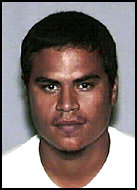 Jose Padilla [pictured], an American born citizen who was listed as an enemy combatant in 2002, was finally charged with a crime after being arrested on suspicion of being the "dirty bomber." Court documents released yesterday make no mention of this alleged plot to conduct a radiological "dirty bomb" attack; instead, Padilla was charged, generally, with engaging in a terrorist conspiracy. The indictment provides Padilla with some semblance of due process and seemingly serves as an attempt by the government to skirt a possible adverse ruling by the U.S. Supreme Court.
Jose Padilla [pictured], an American born citizen who was listed as an enemy combatant in 2002, was finally charged with a crime after being arrested on suspicion of being the "dirty bomber." Court documents released yesterday make no mention of this alleged plot to conduct a radiological "dirty bomb" attack; instead, Padilla was charged, generally, with engaging in a terrorist conspiracy. The indictment provides Padilla with some semblance of due process and seemingly serves as an attempt by the government to skirt a possible adverse ruling by the U.S. Supreme Court.Padilla was arrested on May 8, 2002, and declared an enemy combatant on June 9 of the same year. He did not have access to an attorney until March 3, 2004 -- two years after his detention. He was finally charged, according to indictment papers that were unsealed yesterday, over three years since he was arrested in May of 2002.
In 2004, the U.S. Supreme Court ruled, in Hamdi v. Rumsfeld, 542 U.S. 507 (2004), that an American born individual who was declared an enemy combatant, captured overseas (in this case Afghanistan), and held in the United States must be able to challenge his detention: "due process demands that a citizen held in the United States as an enemy combatant be given a meaningful opportunity to contest the factual basis for that detention before a neutral decisionmaker."
Padilla has a similar case pending before the U.S. Supreme Court. The question the Court would confront is whether an American citizen that has been labeled an enemy combatant, captured in the United States, and held in the United States, has a similar right to challenge his detention. In indicting Padilla, the government perhaps avoided a possible Court ruling in favor of Padilla.
Commenting on the indictment, the Washington Post said, "Dumping Mr. Padilla back in federal court cannot undo the lengthy detention-without-charge that he has endured. But it does help to reestablish the principle that no one can be held indefinitely based only on allegations by the executive branch." Indeed, it was in the Hamdi case that Justice O'Connor famously wrote for the majority, "a state of war is not a blank check for the President when it comes to the rights of the Nation's citizens."
DNSI
0 Comments:
Post a Comment<< Home